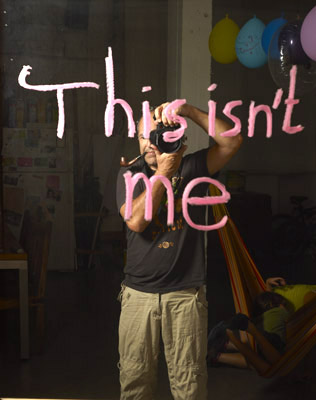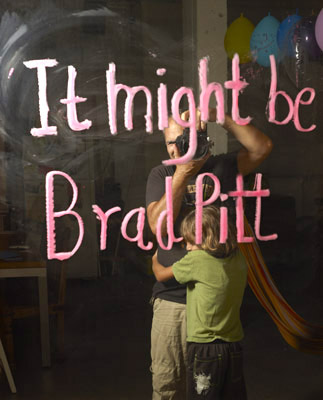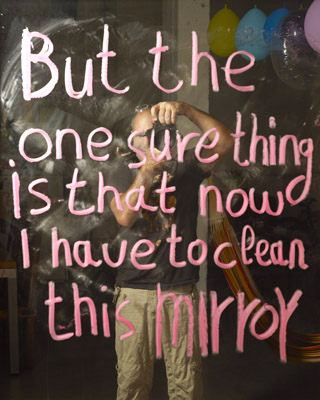 When our eldest was five, she asked us to buy her something she saw in a billboard ad. We convinced her that the desired object wasn’t really worth buying. We compared it to the work we are doing in the studio (by that time she was already very well acknowledged with), in which we are making our shooting objects more desirable then they really are. A day after, she brought home one of her friends. We where at the studio in a shooting session and her friend, whom never saw something like that, asked her what her parents do. “They are lying to other people”, said our cupcake, without any hesitation. Are we indeed?
When our eldest was five, she asked us to buy her something she saw in a billboard ad. We convinced her that the desired object wasn’t really worth buying. We compared it to the work we are doing in the studio (by that time she was already very well acknowledged with), in which we are making our shooting objects more desirable then they really are. A day after, she brought home one of her friends. We where at the studio in a shooting session and her friend, whom never saw something like that, asked her what her parents do. “They are lying to other people”, said our cupcake, without any hesitation. Are we indeed?
Lately I received a link from a close and dear friend of ours. It was an article about “Generation N”-while ‘N’ stands for Narcissism: The 80’s generation and on. Together with the WWW, E-mail, ICQ and it’s successors, Facebook and it’s kind and smartphones, the 80’s generation stayed home with Mom and Dad until their 30’s and getting married (if at all) even later. It’s seems according to Jean M. Twenge and W. Keith Campbell the authors of – “The Narcissism Epidemic: Living in the Age of Entitlement” that they are too busy maintaining their Facebook identity, or should I say, their ‘branding’. Maybe no one told them that they were being lied to by illusive billboards when they were at the age of five.
There is no Angelina Jolie the way we grasp her. It is a Photoshop creation, what makes the attempt to coordinate somebody’s life with that creation, more miserable than rather pathetic. But “Entitlement” is not only the childish: “I want it! I want it!”. “Entitlement” is the inevitable frustration that comes with it, because no one can be Angelina Jolie, not even Angelina Jolie herself.
But what makes it all really sad, is that too much focusing on yourself in the mirror prevents you from seeing anybody else, including those who have got a true potential to love you.
Maybe I am onto something. Or maybe the best thing for me is to stop here and just clean this mess before Yasmin gets back home…
שקרים, תיק-אוכל וילדה בת 5
כשטליה היתה בת 5 היא בקשה לקנות תיק אוכל (סיני, זול, לא איכותי בעליל עם איור של וולט דיסני) שראתה על פוסטר מדיה. שכנענו אותה לוותר בעזרת מה שכבר הכירה היטב מהחיים בסטודיו: הצילום מרמה. למחרת בזמן שהיינו באמצע העבודה, היא הביאה איתה מהגן חברה חדשה. הילדה שאלה בסקרנות מה אנחנו עושים ובתנו האהובה השיבה מיד ובלי למצמץ: “הם משקרים לאנשים“.
איכשהו, כבר 15 שנה שאנחנו חיים בלי ערוצי טלוויזיה. מאוד נוח לנו עם זה והילדים נולדו לתוך המציאות הזו. לא שחסר להם משהו– הם מכירים את כל התוכניות החמות: בבית של סבתא, אצל החברים, וכמובן הכל נמצא באינטרנט. וכל פעם, אחרי 20 דקות של בהייה שלהם בתוכנית סינטטית זו או אחרת במסך המחשב, אני מרגיש איך הפתיל שלנו נגמר ואחד מאיתנו מתפוצץ ומעיף אותם לעשות משהו אחר.
אולי כי אנחנו חושבים שהילדה צדקה אז, כשהיתה בת חמש וזה לא רק אנחנו, זו תעשיה שלמה ש“משקרת לאנשים“?
לפני כמה ימים שלח לנו ג‘ראלד פיטוסי (“Think-There” עד לאחרונה “אהבה“) קישור לכתבה מסקרנת בכלכליסט אודות ענין חדש בארה“ב, הם קוראים לזה: הדור הנרקסיסטי– Generation N. זה בדיוק הדור של ילדי שנות השמונים – אינטרנט, אימייל, אי–סי–קיו, רשתות חברתיות, סמסים, סמארטפונים. מרוב שהם כל הזמן מחוברים לכולם הם מתעסקים בעיקר בעצמם. ג‘יין טוונג וקית‘ קמפבל טוענים בספרם “The Narcissism Epidemic: Living in the Age of Entitlement” שהעיסוק העיקרי ברשת הוא של מיתוג עצמי ולא חברתי במובן הקלאסי שלו. כולם רוצים להיות אנג‘לינה ג‘ולי ובראד פיט. או ממש, ממש, חושבים שמגיע להם להיות. אחת האנקדוטות שהם מעלים בספרם היא ההכפלה ב-500% של כמות הניתוחים הפלסטיים בארה“ב ב–עשרת השנים האחרונות. גם האנשים הופכים להיות סינטטיים יותר. משופצים. “משקרים לאנשים“.
הפתלוגיה של הנרקסיסטיות, כך הם כותבים, מסרסת את האמפתיה, התנאי הבסיסי לקשר אנושי חיובי ומפרה. כשטליה נכנסה אז לסטודיו עם שירז, ידיהן היו שלובות. הן נגעו זו בזו.
ילדים לא משקרים.








2 Responses to Lying to other people